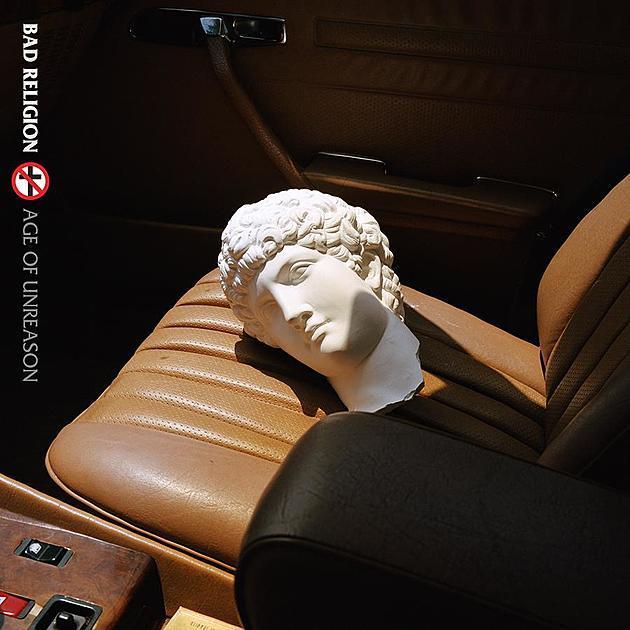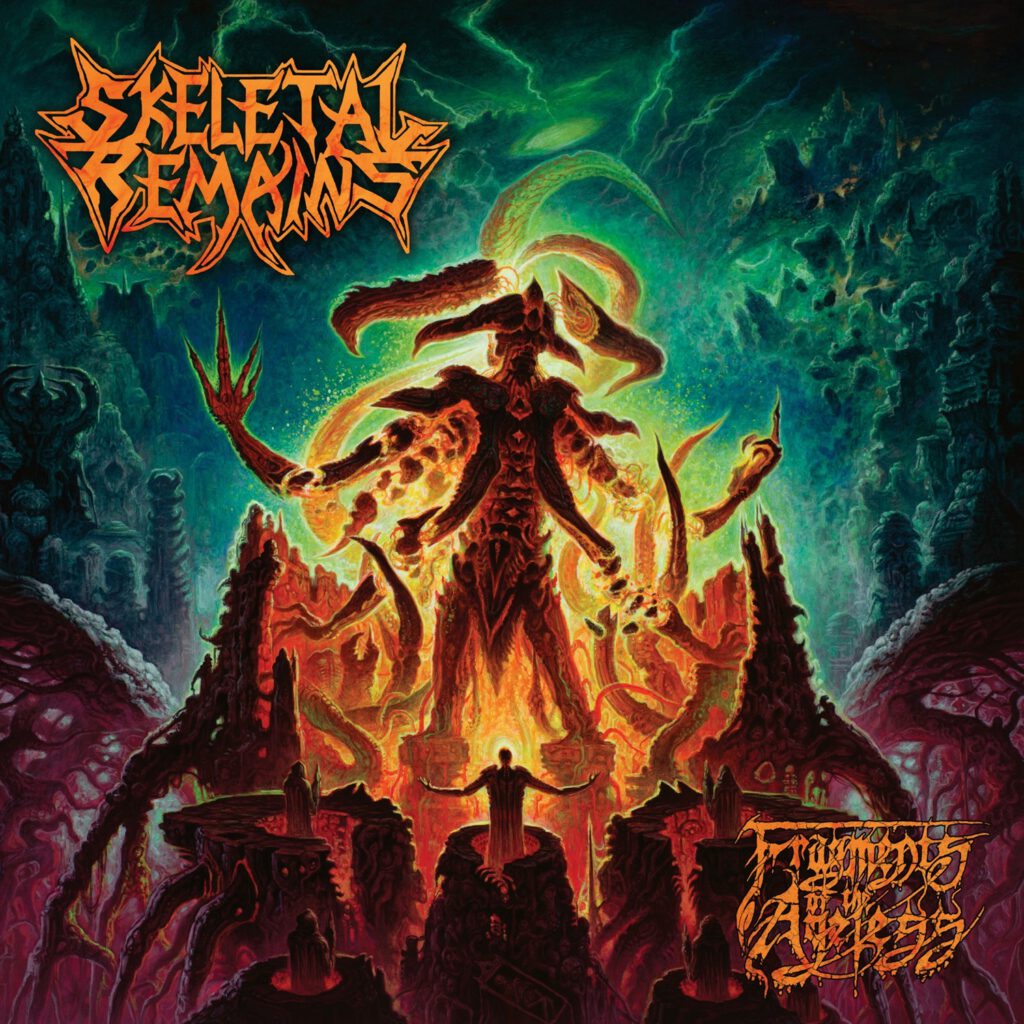Band: Bad Religion
Album: Age of Unreason
Genre: Punk / Skatepunk
Country: USA
Release date: 3rd of May, 2019
Released via Epitaph Records
Cover artwork © Epitah Records 2019
Still remember 2013? Everyone of us was still able to follow the most recent events of Breaking Bad and only some grew interested in the second season of Game of Thrones – Post-Black Metal vanguards Deafheaven dropped their gamechanging classic Sunbather – and Barack Obama was still president of the United States. This was also the year when Punk Rock pioneers Bad Religion released their last album True North via Brett Gurewitz‘s label Epitaph Records. Feeling set back already when you were politically thrilled by the manipulation of facts in the first season of House of Cards? Good – because many things have drastically changed by the release of Bad Religion‘s latest album The Age of Unreason.
Bad Religion is a quintet from Los Angeles that has been known as one of the defining Punk bands from the 1980s. The music that is primarily coined by the politically charged lyrics, fast guitars and anthem-ish chorusses has been influential for many Punk bands to come in the 90s until today. Age of Unreason is their 17th (seventeenth !!!) studio album and follow-up of True North from 2013. The political discourse within the lyrics of Bad Religion have always remained a trademark of the band, which was also why True North received a little less positive critical resonance due to its supposedly watered-down lyrics. Since the release of the album in 2013, however, the US has experienced utter political changes and we want to know whether these properly found their way into the lyrics of this year’s release.
Obviously, it is no secret at all that this album marks Bad Religion‘s first release after several political events that drastically changed different views on the population of many countries – the election of current US president Donald Trump, who caused one or another political “faux pas” – the rise of the Alt-Right movement around Richard Spencer as new and (unfortunately) strong force of the American Right – and the deterioation of foreign politics concerning the relationship with several different transcontinental countries.
This is also where the album takes off, since “Chaos from Within” kicks off by instantly taking a closer look at a population that is doomed to repeat history as long as it refuses to take a glance back as reference for planning the future. The urge to build a wall in order to prevent a certain group of people (Mexicans) from entering your country is an instant point at Donald Trump – right during the first few minutes of the first track. No time to lose. The rise of the right in the US as well as in Europe is tightly connected to a population dealing with fear, linking it to the need of a firm, preferably single-lead government and thus voting towards a national right in order to prevent “impending doom.” This perfectly leads to the following track “My Sanity” in which Bad Religion shout out a plea to stick to your reason instead of being lead by “alternative facts”, since those invented truths are the easiest way to manipulate the electoral outcome of a population obtaining information from Facebook or similar pages.
The lyrical density of the album already becomes evident when solely recapitulating the first two tracks, but we are certainly not done yet. Gurewitz‘s finesse regarding songwriting dives even deeper into well-written theory on “Do the Paranoid Style” when he quotes Richard Hofstadter‘s “Paranoid Style in American Politics,” which is a scientific essay that explored the impact of conspiracy theories on the American population. In this song, Bad Religion link the current political situation in the US to an essay that was written as early as 1964 – again picking up the point from “Chaos from Within” that states the fact of a population being doomed to eternally repeat history when drifting too far away from reality.
Reality or truth is the term that comes up several times throughout the album, since it is the most crucial term when discussing the point of view of all kinds of populists. Thus, the track “Old Regime” addresses the fact that the term reality is preferably formed, reformed or deformed by the aristocrats (most probably the US regimem, in this case). Since reality is the most precious aspect for an adequate discussion of political decisions, it is also worth putting massive endeavour into projecting the truth that is most suitable for the program of your political party or plans.
In the following, there are many different tracks tackling even more subjects such as the impact of Trump’s (or similar) policies on the economy and climate. It would be way too much to get into detail with all of these tracks, although most of them follow a similar lyrical density as the tracks described above. Bad Religion perfectly display, after having remained silent throughout three years of Donald Trump, that they are capable of converting society’s issues into absolutely intelligent music.
So much about the lyrics – but what about the music? The album was produced by Carlos de la Garza, who is also known for producing bands such as Paramore or The Wonder Years. The smooth production, loosely sticking to the sound many listeners already knew from Bad Religion, can be heard throughout the entire record. This is also the first album with Jamie Miller on the drums and Mike Dimkich on 3rd guitar (often replacing Gurewitz on tour due to his duties at Epitaph Records).
The first few tracks follow a similar pattern, going along a mid-tempo and the typical Bad Religion sound many fans know and love. We have fast guitars, catchy anthem-ish chorusses and some solos here and there. However, in the middle of the album the quintet slightly shifts toward a more Rock ‘n’ Roll – ish sound, at some point reminding of Social Distortion. This can be heard on tracks such as “Don’t Lose Your Head” or the album-titled “Age of Unreason,” which casually picks up Thomas Paine‘s “The Age of Reason” and raises awareness of the fact that the current US policy drastically drifts away from what Paine fought for.
At track 9, when “Faces of Grief” kicked off, I inhaled satisfactorily. The first track on the album that punches right in the face after difficultly having dealt with a large topic that is a punch in the face itself. This track gets into more speed and a thrashing Punk sound. There are only two more tracks that take up a similar speed on this album – which is a pity to a certain extent. On the contrary, the mid-tempo that builds the framework for the major share of the tracks on the album is quite necessary so as to put more emphasis on the lyrics – that are the absolute quintessence of the album.
The production in general is quite nice and follows the sound of each song by stressing the most salient features of the different styles we can hear. The only aspect that is presented on every track of the album is a certain singing of “uhs” or “ahs” during chorus / verse or other points. In the beginning, this feels quite fitting for the record, but when you start listening to the tenth track that again needs to have these backing vocals – it might cause a slight annoyance. I can get that for this kind of Punk Rock, these backing vocals can be inserted at many different spots. But especially the faster tracks might also have worked without these backings and would have served as straightforward in-your-face Punk tracks. Nevertheless – this is only a slight downside with regards to the production of the album.
The most important feature to stress on this record is the context it is embedded in. The lyrics on this album show that the recent years did not at all pass Bad Religion, most probably everything got stuck in their head while happening and it eventually found its way onto this decent album. To everyone who is interested in Punk Rock that critically takes a glance at history and society, this album is an absolute must-listen.
★ ★ ★ ★ ★ ★ ★ ★ ☆ ☆
8 / 10
As usual, we added the two favorite tracks to our Transcended Review Playlist






Leave a Reply